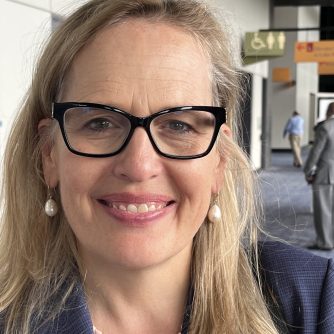
An interview with:
Trevor Leong MD, Peter McCallum Cancer Centre, Radiation Oncology Department, Melbourne, Australia
BARCELONA, Spain—Although pre-operative radiotherapy brought better response rates in patients resected for their gastric or GE-junction adenocarcinomas, there was no improvement in survival. This is the clear finding from a big, long-term study led by an Australian team.
The multi-continent, phase-three randomized TOP GEAR trial, headquartered in Sydney Australia, definitively found no benefit for overall or progression-free survival from adding radiation before surgery.
This clear finding was announced at the 2024 Annual Meeting of the European Society for Medical Oncology (ESMO), held in Barcelona, Spain
First author Trevor Leong MD, from the Radiation Oncology Department of the Peter McCallum Cancer Centre in Melbourne Australia, talked about the results with Peter Goodwin:
Trevor Leong MD interview (8mins 37 secs):
IN: “Resectable gastric or gastro-esophageal…. OUT: ,,’till next time, Good-bye.”
ESMO 2024, Barcelona, ABSTRACT:
“A randomised phase three trial of perioperative chemotherapy (CT) with or without pre-operative chemoradiotherapy (CRT) for resectable gastric cancer (AGITG TOPGEAR). Final results from an intergroup trial of AGITG, TROG, EORTC and CCTG”.
NEJM September 13, 2024:
https://www.nejm.org/doi/full/10.1056/NEJMoa2405195
TITLE:
“Preoperative Chemoradiotherapy for Resectable Gastric Cancer”
From: The Australasian Gastro-Intestinal Trials Group, National Health and Medical Research Council Clinical Trials Centre, Trans-Tasman Radiation Oncology Group, European Organisation for Research and Treatment of Cancer, and Canadian Cancer Trials Group.
JOURNAL Article: N Engl. J Med.:
“The addition of preoperative chemoradiotherapy to perioperative chemotherapy did not improve overall survival as compared with perioperative chemotherapy alone among patients with resectable gastric and gastroesophageal junction adenocarcinoma.”
“A randomised phase three trial of perioperative chemotherapy (CT) with or without pre-operative chemoradiotherapy (CRT) for resectable gastric cancer (AGITG TOPGEAR). Final results from an intergroup trial of AGITG, TROG, EORTC and CCTG”.
Background
In Western countries, the current standard of care for resectable gastric cancer is periop CT. There is much interest in preop CRT, but comparison to periop CT alone is lacking. In TOPGEAR we hypothesized that adding preop CRT to periop CT would improve pathological complete response (pCR) rates and ultimately overall survival (OS) compared to periop CT alone.
Methods
This international phase 3 trial randomized patients with resectable adenocarcinoma of the stomach and gastro-esophageal junction to periop CT alone, or with preop CRT. The periop CT alone group received 3 cycles of epirubicin/cisplatin/5-fluorouracil (ECF) or 4 cycles of fluorouracil/leucovorin/oxaliplatin/docetaxel (FLOT) both pre- and post-operatively. The preop CRT group received one less cycle of preop chemotherapy followed by chemoradiotherapy (45 Gy in 25 fractions radiation plus infusional 5-FU ), and then the same postop chemotherapy. The primary endpoint was overall survival, and secondary endpoints included progression free survival (PFS), pCR rates, toxicity and quality of life.
Results
Between September 2009 and May 2021, 574 patients were enrolled from 70 sites across 15 countries in Australasia, Europe, and Canada; 288 to periop CT group and 286 to preop CRT group. Compared to periop CT alone, patients receiving preop CRT achieved a higher pCR rate (16.7% vs 8.0%), a higher rate of major pathological response (0 – <10% residual tumor: 49.5% vs 29.3%), and greater tumor downstaging following resection. After a median follow-up of 66.7 months, there was no significant difference in OS or PFS: median OS periop CT 49.4 months vs preop CRT 46.4 months; median PFS periop CT 31.8 months vs preop CRT 31.4 months. Preop CRT was not associated with increased perioperative treatment toxicity or a higher rate of surgical complications.
Conclusions
Despite improving pathological outcomes, the addition of preop CRT to periop CT does not improve overall survival compared to periop CT alone in patients with resectable gastric and gastro-esophageal junction adenocarcinoma.
Clinical trial identification
ACTRN12609000035224. Registered 30 May 2009; NCT01924819.
Legal entity responsible for the study
Australasian Gastro-Intestinal Trials Group (AGITG).
Funding
This work was supported by grants from the National Health and Medical Research Council: 1046425 and 2000711, Canadian Institutes of Health Research (CIHR) grant no. 119445, the Canadian Cancer Society Research Institute (CCSRI) grant no. 021039, the Health Research Council of New Zealand (HRC) International Investment Opportunities Fund: Contract no. 09/624, the EORTC Cancer Research Fund, and the Cancer Australia Priority-driven Collaborative Research Scheme: Project ID: 570996.
Disclosure
K.M. Haustermans: Financial Interests, Personal, Other, Clinical editor Radiotherapy & Oncology: Elsevier; Financial Interests, Institutional, Funding: IBA; Financial Interests, Institutional, Research Grant: Varian,
Editorial acknowledgement
Editorial and medical writing support was provided in accordance with Good Publication Practice guidelines by Lewis Cawkwell, PhD, of Parexel, and was funded by AstraZeneca.
Legal entity responsible for the study
AstraZeneca.








